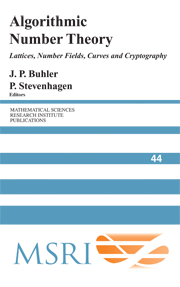Book contents
- Frontmatter
- Contents
- Preface
- Solving the Pell equation
- Basic algorithms in number theory
- Smooth numbers and the quadratic sieve
- The number field sieve
- Four primality testing algorithms
- Lattices
- Elliptic curves
- The arithmetic of number rings
- Smooth numbers: computational number theory and beyond
- Fast multiplication and its applications
- Elementary thoughts on discrete logarithms
- The impact of the number field sieve on the discrete logarithm problem in finite fields
- Reducing lattice bases to find small-height values of univariate polynomials
- Computing Arakelov class groups
- Computational class field theory
- Protecting communications against forgery
- Algorithmic theory of zeta functions over finite fields
- Counting points onvarieties over finite fields of small characteristic
- Congruent number problems and their variants
- An introduction to computing modular forms using modular symbols
The impact of the number field sieve on the discrete logarithm problem in finite fields
Published online by Cambridge University Press: 30 May 2025
- Frontmatter
- Contents
- Preface
- Solving the Pell equation
- Basic algorithms in number theory
- Smooth numbers and the quadratic sieve
- The number field sieve
- Four primality testing algorithms
- Lattices
- Elliptic curves
- The arithmetic of number rings
- Smooth numbers: computational number theory and beyond
- Fast multiplication and its applications
- Elementary thoughts on discrete logarithms
- The impact of the number field sieve on the discrete logarithm problem in finite fields
- Reducing lattice bases to find small-height values of univariate polynomials
- Computing Arakelov class groups
- Computational class field theory
- Protecting communications against forgery
- Algorithmic theory of zeta functions over finite fields
- Counting points onvarieties over finite fields of small characteristic
- Congruent number problems and their variants
- An introduction to computing modular forms using modular symbols
Summary
Let p be a prime number and n a positive integer, and let q = pn. Let 𝔽q be the field of q elements and denote by 𝔽*q the multiplicative subgroup of 𝔽*q. Assume t and u are elements in 𝔽*q with the property that u is in the subgroup generated by t. The discrete logarithm of u with respect to the base t, written logt u, is the least non-negative integer x such that tx= u.
In this paper we describe two methods to compute discrete logarithms, both of which derive from the number field sieve (NFS) factoring algorithm described in [Stevenhagen 2008] and [Lenstra and Lenstra 1993].
Information
- Type
- Chapter
- Information
- Algorithmic Number TheoryLattices, Number Fields, Curves and Cryptography, pp. 397 - 420Publisher: Cambridge University PressPrint publication year: 2008
